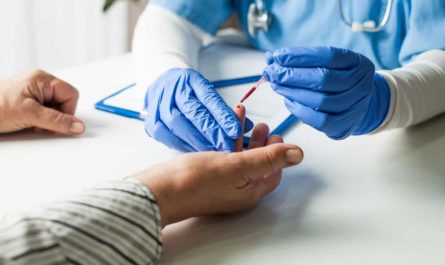
Everyone understands that diabetes is a chronic disease and must live with it and treat it for life. For that reason, patients are always worried about their illness getting worse. They worry about looking for symptoms of end-stage diabetes to see if they fall into that situation or not.
Let’s learn more specifically about this issue through the information below!
Are there symptoms of end-stage diabetes?
In medicine, diabetes is not divided into stages but into types. Each type of diabetes has different symptoms. Therefore, in this article we will discuss the symptoms of end-stage diabetes, which are signs of serious disease. You can also understand it as a symptom of severe diabetes.
Symptoms of diabetes in all types
Common diabetes signs include:
- Frequent urination, often at night
- Very thirsty
- Unexplained weight loss
- Hungry
- Blurred vision
- Numbness or tingling in hands or feet
- Prolonged fatigue
- Dry skin
- Ulcers or wounds that take a long time to heal
- More infections than usual.
Symptoms of type 1 diabetes

Type 1 diabetes progresses very quickly. Symptoms of the disease appear rapidly and seriously after only a few weeks or months of illness. This is a characteristic of type 1 diabetes, so it cannot be considered that at diagnosis, the patient already has symptoms of end-stage diabetes.
In addition to the common signs mentioned above, you may experience nausea, vomiting or stomach pain.
However, if left untreated, you are at risk of suffering the harmful effects of type 1 diabetes . It is a complication of ketoacidosis that develops rapidly within 24 hours, and can lead to coma and death. with symptoms of end-stage diabetes as follows:
- Very thirsty
- Frequent urination
- Nausea, vomiting
- Stomach-ache
- Weak, tired
- Out of breath
- Breath smells fruity
- Confusion
- Blood sugar above 300 mg/dL (or 16.7 mmol/L)
- Urine test for ketones.
Most type 1 diabetes is diagnosed in children and adolescents, but symptoms are the same across all ages. Adults may not recognize the disease as early as children.
Symptoms of type 2 diabetes

Type 2 diabetes is easier to miss because it progresses slowly and silently. When you first get the disease, to put it simply, the early stages of diabetes symptoms are often difficult to detect. Most patients are diagnosed when there are signs of chronic complications (on the nerves, blood vessels, eyes, kidneys, heart, feet…), after many years of having the disease without knowing it. If patients are lucky enough to detect early and control blood sugar levels, they can prevent these complications.
In addition, people with type 2 diabetes may also experience life-threatening emergency complications such as increased osmotic pressure . This happens when blood sugar rises very high above 600 mg/dL and the body becomes seriously dehydrated. Symptoms of late-stage diabetes usually develop within a few days to a few weeks, including:
- Mental changes such as confusion, delirium, hallucinations
- Loss of consciousness
- Dry mouth, extreme thirst
- Frequent urination
- Blurred vision or loss of vision
- Weakness or paralysis, one side of the body may be worse.
Symptoms of gestational diabetes
Gestational diabetes often does not have any symptoms. During weeks 24-28 of pregnancy, your doctor will do a diabetes test to see if you have this condition. Most people with gestational diabetes need to change their lifestyle and diet to overcome it.
When should you worry about symptoms of end-stage diabetes?

In general, having complications from type 2 diabetes is not necessarily irreversible. You can also consider this a symptom of end-stage diabetes, which is dangerous and should be actively treated to prevent it from getting worse. Signs of illness at this time may include:
- Diabetic retinopathy : Gradually blurred vision, sudden loss of vision, black streaks floating in vision, eye pain, red eyes, difficulty seeing in low light
- Foot complications: Nerve damage due to high blood sugar causes numbness, itching, and loss of feeling in the feet. You will have a hard time detecting cuts and ulcers. Besides, high blood sugar also damages blood vessels, reducing blood flow to the legs, so wounds heal very slowly. This is also the reason to check your feet regularly. In some serious cases, if not treated promptly, the leg must be amputated.
- Cardiovascular disease: Damage to blood vessels sometimes leads to myocardial infarction and stroke.
- Kidney disease: The kidney’s blood filtering part is also made of many small blood vessels, so diabetes can cause damage to the kidneys. At this time, it is more difficult to remove waste and excess fluid in the blood, causing edema, frequent urination, foamy urine, nausea and fatigue. Kidney complications are also considered serious and can be considered a symptom of end-stage diabetes because the burden of dialysis and artificial kidney replacement is huge.
- Neurological disease: Nerve damage caused by hyperglycemia can affect the transmission of messages between the brain and every part of the body, hindering hearing, seeing, feeling and moving.
In addition, diabetes also makes you susceptible to gum infections, women to oral thrush or urinary tract infections, men to erectile dysfunction…
When you experience any of the above chronic complications, you are at risk of developing other complications of diabetes. Therefore, although there is no concept of symptoms of end-stage diabetes, never be subjective about disease complications and never neglect blood sugar control.






